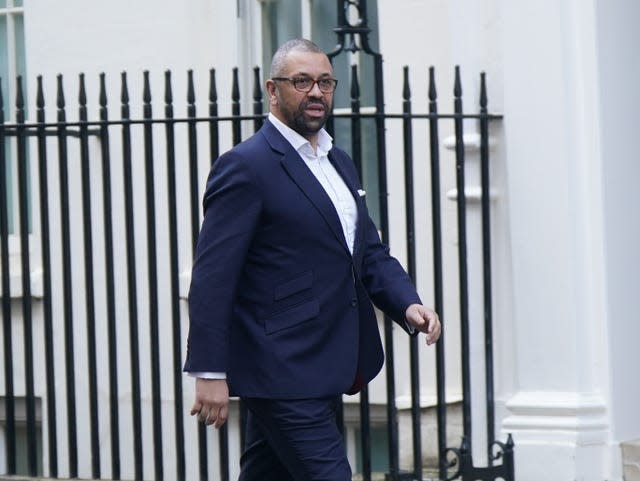Government stands by Windsor Framework deal on Brexit

The Government has insisted it has no plans to renegotiate the Windsor Framework Brexit deal despite the DUP vowing to vote against it in Parliament.
Sir Jeffrey Donaldson said DUP officers met on Monday morning and unanimously agreed to vote against the first aspect of the framework to be considered by Parliament, the Stormont brake.
While the vote only concerns one aspect of the accord, the Government itself has suggested the vote will be indicative of support for the overall agreement.
The DUP is currently blocking devolution at Stormont in protest at the terms of the post-Brexit Northern Ireland Protocol.

The protocol was designed to prevent a hardening of the land border on the island of Ireland and moved regulatory and customs checks to the Irish Sea, creating economic barriers on the movement of goods between Great Britain and Northern Ireland.
The UK and EU agreed the framework as a way to cut the red tape created by the protocol.
While the DUP says the Windsor Framework has gone some way to address its concerns about the protocol, it says some significant problems remain.
Downing Street said ministers stood ready to have further consultations with the DUP ahead of Wednesday’s Commons vote on the Windsor Framework.
Meanwhile, Foreign Secretary James Cleverly has announced that he will meet the EU’s Maros Sefcovic in London on Friday to formally adopt the Windsor pact at a meeting of the joint committee on the Withdrawal Agreement.
The Prime Minister’s official spokesman said: “We remain confident that this is the best deal for Northern Ireland.
“Of course we wanted to give the DUP and other parties as much time as possible to consider the deal and come to a view.
“Equally we need to provide certainty to the people and businesses of Northern Ireland which is why we have started the process of votes.
“The DUP are important partners in this.
“We want to answer any further questions they have and provide any necessary reassurance and we stand ready to do that.”

The brake would allow a minority of MLAs at Stormont to formally flag concerns about the imposition of new EU laws in Northern Ireland – a move that could see the UK Government veto their introduction in the region.
The first Commons vote on the EU/UK agreement on trading arrangements for Northern Ireland will be on the secondary legislation that would give effect to the Stormont brake.
The legislation was published on Monday and set out in detail how the brake would operate.
The DUP has highlighted that the brake only applies to new EU rules proposed for Northern Ireland, not the existing ones already in place under the terms of the protocol.
The Government contends that existing EU law in Northern Ireland will be subject to a consent vote in the Assembly in 2024 under the original terms of the protocol.
Announcing the party’s intention ahead of Wednesday’s vote, Sir Jeffrey said: “Whilst representing real progress, the brake does not deal with the fundamental issue which is the imposition of EU law by the protocol.”
Sir Jeffrey did not rule out ultimately backing the Windsor Framework but insisted the Government would first have to address and resolve the outstanding issues his party has.
“Clearly there is still some way to go, there is a lot more work to be done, we’re engaged with the Government on that, and we will make our judgments whenever we see the final picture of all of this,” he told the PA news agency.
The DUP leader suggested those changes could be secured by way of domestic legislation at Westminster, rather than a renegotiation with Brussels.
“We do believe that the UK government has within its power the ability to bring forward legislation that safeguards Northern Ireland’s place within the United Kingdom and our ability to trade within the internal market of the United Kingdom, so it is to the Government we are looking, and will continue to look for the change that is required to meet the concerns that we have highlighted already,” he said.
The deal is done & huge economic opportunities are before us. The Brexit Joint Committee meets 24 March to adopt the deal into EU law & we move onto implementation stage. The onus is on the British & Irish Governments & all parties – not least the DUP to now get Stormont moving
— Michelle O’Neill (@moneillsf) March 20, 2023
The DUP leader did also not definitively rule out the prospect of his party rejecting the framework but still returning to devolution at Stormont.
“Clearly we will continue to assess any change that is made to the proposed arrangements, including through legislation that will come forward in Parliament, and of course we’ll then take a view as to what progress has been made and if that progress is sufficient to enable the institutions to be restored,” he said.
London, Brussels and Washington are keen for the Stormont institutions to be restored ahead of next month’s landmark 25th anniversary of the Good Friday Agreement.
President Joe Biden is among those set to visit Northern Ireland next month to mark the deal that established powersharing in Belfast.
Sinn Fein Stormont leader Michelle O’Neill has said the Windsor Framework negotiations were done, and the onus was now on getting devolution restored.
“The deal is done & huge economic opportunities are before us,” she tweeted.
“The Brexit Joint Committee meets 24 March to adopt the deal into EU law & we move onto implementation stage.
“The onus is on the British & Irish Governments & all parties – not least the DUP to now get Stormont moving.”

 Yahoo News
Yahoo News 
